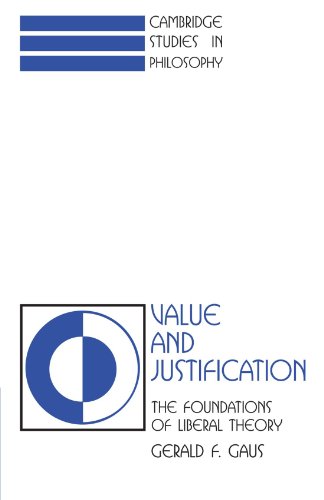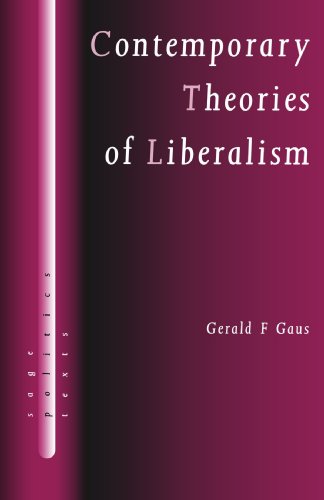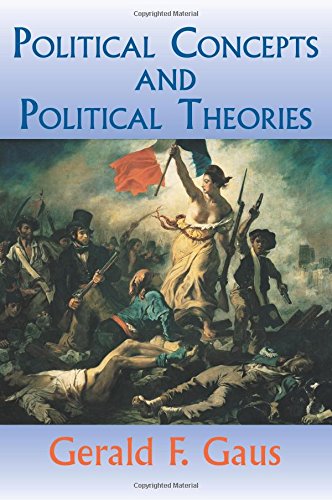Background
Gaus, Gerald F. was born on July 12, 1952 in Buffalo. Son of Herman Otto and Gertrude Rose Gaus.


(This important new book takes as its points of departure ...)
This important new book takes as its points of departure two questions: What is the nature of valuing? and What morality can be justified in a society that deeply disagrees on what is truly valuable? In Part One, the author develops a theory of value that attempts to reconcile reason with passions. Part Two explores how this theory of value grounds our commitment to moral action. The author argues that rational moral action can neither be seen as a way of simply maximising one's own values, nor derived from reason independent of one's values. Rather, our commitment to the moral point of view is presupposed by our value systems. The book concludes with a defense of liberal political morality.
http://www.amazon.com/gp/product/0521397332/?tag=2022091-20

('The author has provided us with a masterful overview and...)
'The author has provided us with a masterful overview and critique of liberal theorizing of the past quarter-century. While dealing exhaustively and fairly with each of a variety of broadly liberal approaches, Gaus also presents a compelling argument for his own preferred "justificatory" approach. His analyses range across familiar territory - Berlin, Gauthier, Baier, Habermas, social choice theory, Rawls, and so on - and are always illuminating and, taken together, provide both the newcomer and the old-hand much to ponder' - Fred D'Agostino, University of New England, Armidale 'All that man is and all that raises him above animals he owes to his reason' - Ludwig von Mises Contemporary Theories of Liberalism provides students with a comprehensive overview of the key tenets of liberalism developed through Hobbes, Locke, Kant and Rawls to present day theories and debates. Central to recent debate has been the idea of public reason. The text introduces and explores seven dominant theories of public reason, namely, pluralism, Neo-Hobbesianism, pragmatism, deliberative democracy, political democracy, Rawlsian political liberalism and justificatory liberalism. As a proponent of justificatory liberalism, Gaus presents an accessible and critical analysis of all contempoary liberal political theory and powerfully illustrates the distinct and importsant contribution of justificatory liberalism. Contemporary Theories of Liberalism is essential reading for students and academics seeking a deeper understanding of liberal political theory today.
http://www.amazon.com/gp/product/0761961399/?tag=2022091-20

(In this innovative and important work, Gerald Gaus advanc...)
In this innovative and important work, Gerald Gaus advances a revised, and more realistic, account of public reason liberalism, showing how, in the midst of fundamental disagreement about values and moral beliefs, we can achieve a moral and political order that treats all as free and equal moral persons. The first part of this work analyzes social morality as a system of authoritative moral rules. Drawing on an earlier generation of moral philosophers such as Kurt Baier and Peter Strawson as well as current work in the social sciences, Gaus argues that our social morality is an evolved social fact, which is the necessary foundation of a mutually beneficial social order. The second part considers how this system of social moral authority can be justified to all moral persons. Drawing on the tools of game theory, social choice theory, experimental psychology, and evolutionary theory, Gaus shows how a free society can secure a moral equilibrium that is endorsed by all, and how a just state respects, and develops, such an equilibrium.
http://www.amazon.com/gp/product/1107668050/?tag=2022091-20

( Political Concepts and Political Theories introduces po...)
Political Concepts and Political Theories introduces political theory by focusing on enduring disputes about the nature of freedom, power, equality, justice, democracy, and authority. The first part of the book examines the nature of these disputes. It clarifies what we are disagreeing about when we offer different interpretations of political concepts, and why our disagreements about them are so difficult to resolve. Providing accessible accounts of the views of Plato, Wittgenstein, and recent theorists such as Gallie, Gaus argues that our interpretation of a political concept such as liberty is not freestanding but linked to our understandings of power, equality, justice, democracy, and other values. To understand a particular political concept, Gaus argues, we must place it in a political theory, which constitutes a system of such concepts. The second part of the book examines the ways in which liberal, socialist, and conservative thinkers have interpreted these enduring political concepts. Gaus considers a wide range of classical and contemporary advocates of these theories.Political Concepts and Political Theories presents in an accessible way an innovative approach to the analysis of political concepts and the study of political theory. As such, it will be of interest both to those looking at political concepts and political theories for the first time, as well as to scholars who have already examined these issues.
http://www.amazon.com/gp/product/0813333318/?tag=2022091-20
Gaus, Gerald F. was born on July 12, 1952 in Buffalo. Son of Herman Otto and Gertrude Rose Gaus.
Bachelor, State University of New York, Buffalo, 1974. Master of Arts, Doctor of Philosophy, University Pittsburgh, 1979.
Professor philosophy and political science University Minnesota, Duluth, 1988-2000. Professor ethics public philosophy Queensland University of Technology, Brisbane, Australia, 1996-1998. Professor philosophy Tulane University, New Orleans, since 2000.
(In this innovative and important work, Gerald Gaus advanc...)
(This important new book takes as its points of departure ...)
( Political Concepts and Political Theories introduces po...)
('The author has provided us with a masterful overview and...)
(Hard-cover copy of "The Modern Liberal Theory of Man.")
Member American Philosophical Association, American Political Science Association, International Economics and Philosophy Society (president 1993-1998.
Married Andrea Frances Wasik, July 1, 1974. 1 child, Kelly.
